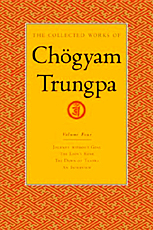"Crazy wisdom is the basic norm or the basic logic of sanity. It is a transparent view that cuts through conventional norms or conventional emotionalism. It is the notion of relating properly with the world. It is knowing how much heat is needed to boil water to make a cup of tea, or how much pressure you should apply to educate your students. That level of craziness is very wise. It is based on being absolutely wise, knowing exactly what to do. Such a wise person is well-versed in the ways of the world, and he has developed and understood basic logic. He knows how to build a campfire, how to pitch a tent, and how to brush his teeth. He knows how to handle himself in relating to the world, from the level of knowing how to make a good fire in fireplace up to knowing the fine points of philosophy. So there is absolute knowledgeability. And then, on top of that, craziness begins to descend, as an ornament to the basic wisdom that is already there.
"In other words, crazy wisdom does not occur unless there is a basic understanding of things, a knowledge of how things function as they are. There has to be a trust in the normal functioning of karmic cause and effect. Having been highly and completely trained, then there is enormous room for crazy wisdom. According to that logic, wisdom does not exactly go crazy; but on top of the basic logic or basic norm, craziness as higher sanity, higher power, or higher magic, can exist.
"One attribute of crazy wisdom is fearlessness. Having already understood the logic of how things work, fearlessness is the further power and energy to do what needs to be done, to destroy what needs to be destroyed, to nurse what should be nursed, to encourage what should be encouraged, or whatever the appropriate action is.
"The fearlessness of crazy wisdom is also connected with bluntness. Bluntness here is the notion of openness. It is a sense of improvising, being resourceful, but not in the sense of constantly trying to improvise the nature of the world. There are two approaches to improvising. If we have a convenient accident and we capitalize on that, we improvise as we go along. That is the conventional sense of the word. For instance, we might become a famous comedian, not because of our perceptiveness, but purely because we make funny mistakes. We say the wrong things at the wrong time and people find us hilarious. Therefore we become a famous comedian. That is approaching things from a back door, or more accurately, it is like hanging out in the backyard.
"The other approach to improvising, or bluntness, is seeing things as they are. We might see humor in things; we might see strength or weakness. In any case, we see what is there quite bluntly. A crazy wisdom person has this sense of improvising. If such a person sees that something needs to be destroyed rather than preserved, he strikes on the spot. Or if something needs to be preserved, although it might be decaying or becoming old hat, he will nurse it very gently.
"So crazy wisdom is absolute perceptiveness, with fearlessness and bluntness. Fundamentally, it is being wise, but not holding to particular doctrines or disciplines or formats. There aren't any books to follow. Rather, there is endless spontaneity taking place. There is room for being blunt, room for being open. That openness is created by the environment itself. In fact, at the level of crazy wisdom, all activity is created by the environment. The crazy wisdom person is just an activator, just one of the conditions that have evolved in the environment.”
